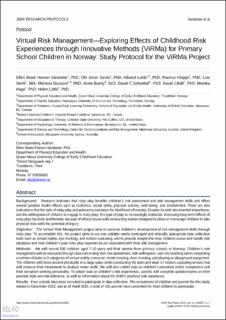Virtual Risk Management—Exploring Effects of Childhood Risk Experiences through Innovative Methods (ViRMa) for Primary School Children in Norway: Study Protocol for the ViRMa Project
Sandseter, Ellen Beate Hansen; Sando, Ole Johan; Lorås, Håvard Wuttudal; Kleppe, Rasmus; Storli, Lise; Brussoni, Mariana; Bundy, Anita; Schwebel, David C; Ball, David; Haga, Monika; Little, Helen
Peer reviewed, Journal article
Published version

Åpne
Permanent lenke
https://hdl.handle.net/11250/3072401Utgivelsesdato
2023Metadata
Vis full innførselSamlinger
- Artikler (Articles) [173]
- Publikasjoner fra Cristin - DMMH [138]
Sammendrag
Research indicates that risky play benefits children’s risk assessment and risk management skills and offers several positive health effects such as resilience, social skills, physical activity, well-being, and involvement. There are also indications that the lack of risky play and autonomy increases the likelihood of anxiety. Despite its well-documented importance, and the willingness of children to engage in risky play, this type of play is increasingly restricted. Assessing long-term effects of risky play has been problematic because of ethical issues with conducting studies designed to allow or encourage children to take physical risks with the potential of injury. Virtual Risk Management—Exploring Effects of Childhood Risk Experiences through Innovative Methods (ViRMa) for Primary School Children in Norway: Study Protocol for the ViRMa Project
